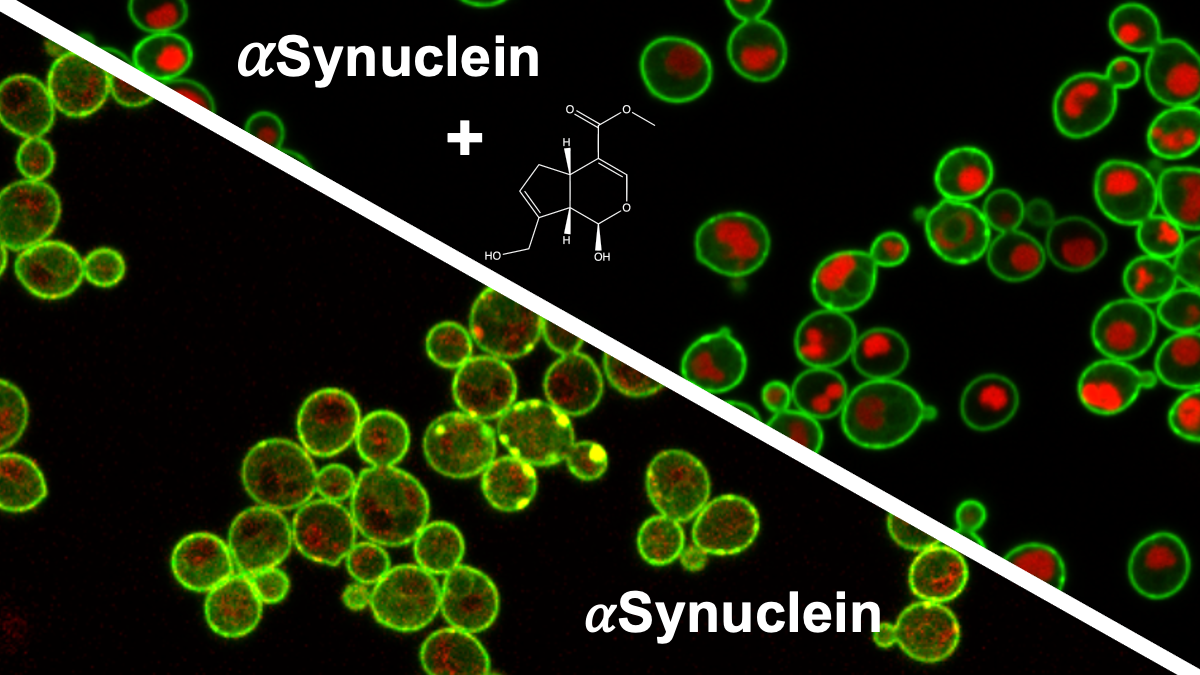NMS researchers unveil a compound from camarinha leaves, genipin, with potential as an innovative treatment for Parkinson's disease.
![Image[8] - Cópia (2)](/Portals/0/adam/NMS Generic Content/QSBCzte-BU603-jM8ZtfCg/Content/Image[8] - Cópia (2).jpeg)
Daniela Marques, Cláudia Nunes dos Santos and Rita Rosado-Ramos
Cláudia Nunes dos Santos lab at NOVA Medical School (NMS), Molecular Nutrition and Health, has made a significant breakthrough in Parkinson's disease (PD) research, offering new hope for millions of individuals affected by this debilitating condition. Their ground-breaking study, titled "Genipin Prevents Alpha-Synuclein Aggregation and Toxicity by Affecting Endocytosis, Metabolism, and Lipid Storage," has recently been published in the prestigious scientific journal Nature Communications. It was also highlighted by Público newspaper with an interview with the principal researcher of the study.
Led by first authors Rita Rosado-Ramos (NMS), and Gonçalo Poças (from the Pedro Domingos lab at ITQB NOVA) and last author Cláudia Nunes dos Santos, the research team embarked on a mission to identify novel therapeutic strategies to combat PD. Parkinson's disease, a neurodegenerative disorder characterized by the progressive loss of motor function, affects millions of people worldwide. Despite extensive research efforts, a cure for PD remains elusive, making the exploration of new treatment options a crucial endeavour.
Building upon their previous work, which demonstrated the extract of C. album L. (camarinha) leaves' ability to attenuate critical events in PD pathogenesis, the team delved deeper into understanding the mechanisms behind the extract's protective effects against alpha-synuclein (αSyn) toxicity and aggregation—a hallmark of Parkinson's disease. The plant extract was found to have beneficial effects regarding the reduction αSyn toxicity, but the specific compound responsible for these benefits remained elusive. Determined to uncover the active molecule, the researchers initiated the fractionation of the leaf extract.

αSyn signal in cell with and without genipin
Through rigorous investigation using cellular and animal models of αSyn aggregation, the researchers successfully identified genipin, an iridoid, as the crucial compound responsible for inhibiting αSyn aggregation and toxicity. This work further solidifies the focus of the research group in the study of natural small molecules to decrease the severity of neurodegenerative diseases symptoms. Furthermore, the study revealed that this specific iridoid exerts its protective effects by influencing multiple cellular processes, including endocytosis, metabolism, and lipid storage.
"These findings reported in our study pave the way for the exploitation of genipin in mammalian preclinical models and as a lead molecule for PD therapeutics," commented Rita Rosado-Ramos. "Moreover, while we strongly suggest that genipin provides a potential lead molecule for PD therapy, it would be interesting to explore the chemical diversity of this class of iridoid compounds or modify its chemistry to search for improved lead candidates".
The significance of this research is vast, as Parkinson's disease imposes a considerable burden on individuals and society at large. With its multifactorial nature, understanding the molecular basis of PD and developing effective therapeutic strategies are paramount. "Huge efforts have been made both to understand the molecular basis of PD and to tackle disease progression", explained Cláudia Nunes dos Santos, the principal investigator of the study. "So far, there is no cure, and the lack of effective therapeutic strategies has given PD public health priority status".
As the research progresses, numerous questions remain to be addressed. These findings not only highlight the potential of genipin as a therapeutic candidate but also open up avenues for exploring the chemical diversity within this class of iridoid compounds to optimize its therapeutic properties and identify potential improvements.
The collaborative nature of this research underscores the global effort to tackle Parkinson's disease. Researchers from NOVA Medical School (including the group of prinicipal investigator César Mendes, Neurogenetics of Locomotion and the group of principal investigator Miguel Seabra, Molecular Mechanisms of Disease), Instituto de Biologia Experimental e Tecnológica (iBET), Instituto de Tecnologia Química e Biológica António Xavier (ITQB NOVA), and several international institutions united in their commitment to advancing our understanding of neurodegenerative disorders.
Read the full scientific article here. You can also read the Público newspaper article here.
Cláudia Nunes dos Santos
Principal Investigator
Daniela Marques
PhD Student
César Mendes
Principal Investigator
Miguel Seabra
Principal Investigator